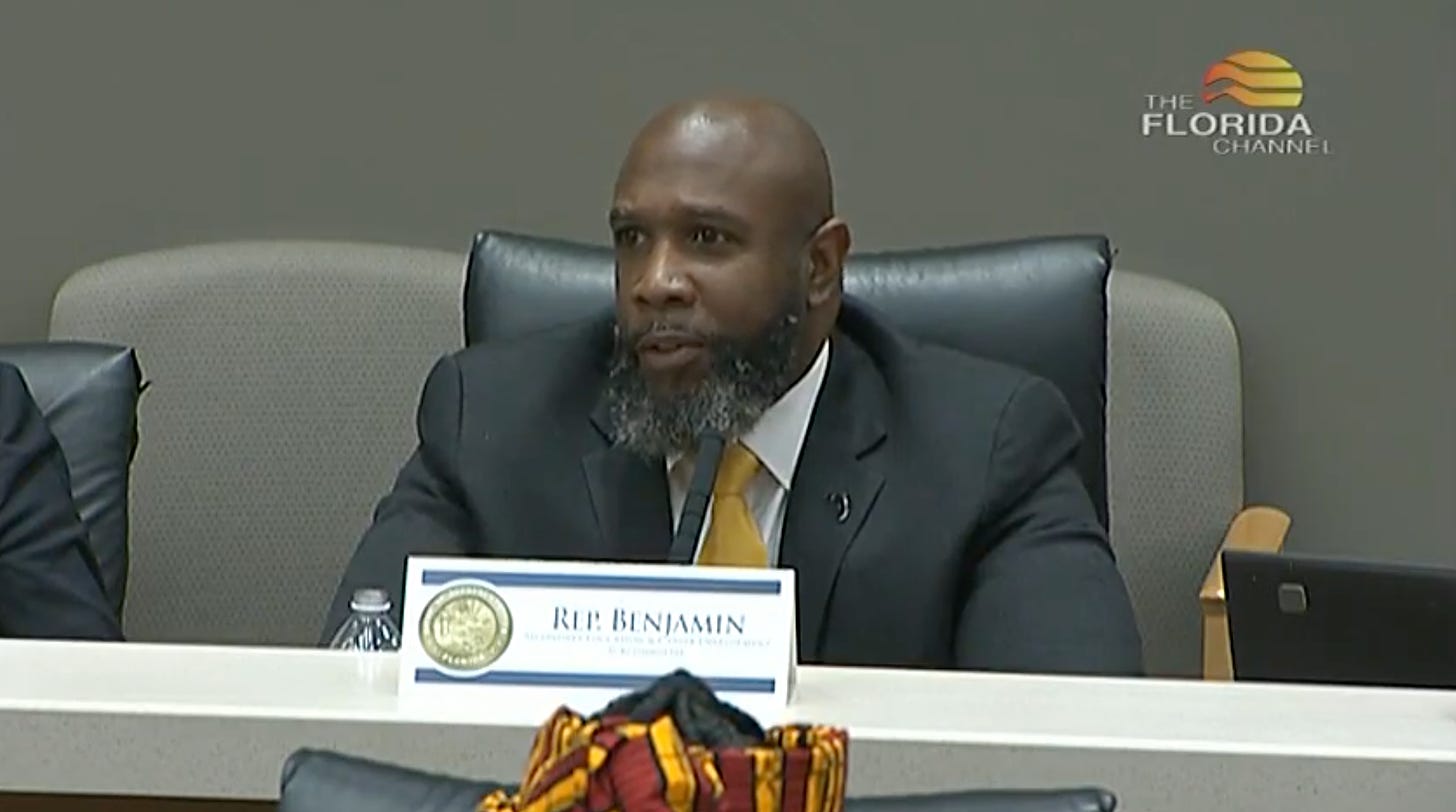The corporate lobby lost
In a legislative session dominated by ugly culture wars, here’s something all Floridians can feel good about

An interesting thing happened about halfway through this year’s legislative session.
A minor committee in the Florida House of Representatives met to hear House Bill 1447, which would have created a new tax credit for businesses that hire apprentices.
It was the sort of bill that typically breezes through committees in Tallahassee. The legislation was technical and arcane but had a broadly popular and easy-to-understand goal. And it was being pushed by an influential company (defense contractor Lockheed Martin Corp.) but had the appearance of widespread support thanks to front groups such as the Florida Chamber of Commerce and the Orlando Economic Partnership.
But instead of simply singing the praises of apprentices and moving the bill along to its next stop, a few legislators on the committee decided to dig into things. Through a series of pointed questions and some skeptical debate, Democratic Reps. Christopher Benjamin of Miami Gardens, Felicia Robinson of Miami Gardens and Marie Woodson of Hollywood exposed the fact that this proposed tax break was only going to help the state’s biggest corporations. It wasn’t going to save a dime for Florida’s small businesses.
That’s because HB 1447 was a corporate income tax break, and only 1 percent of Florida businesses actually pay Florida corporate income tax. So when the Florida Legislature cuts the corporate tax, it saves money only for a small handful of the biggest and most profitable companies in the country – companies like Lockheed Martin (which, by the way, stood to save an estimated $900,000 a year from the apprenticeship tax credit).
By the end of the hearing, even the bill’s supporters acknowledged that only big businesses were likely to save any money.
“Members,” Rep. Stan McClain, the Ocala Republican who chaired the committee, said just before a vote on the legislation, “I’d just like to say that – while you’ve raised some questions that I think are important, especially for small businesses – I think one of the things that we should probably realize is that a lot of our big companies and corporations are the ones that are probably doing a lot of this apprenticeship work and certainly paying a lot in corporate tax. So I think...it’s a great bill.”
The committee approved HB 1447 on a unanimous vote. But the bill never moved again for the rest of session.
More importantly, the hearing was a harbinger of one of the biggest decisions Florida lawmakers made during the 2022 legislative session: The bipartisan rejection of massive corporate income tax cuts that, had they passed, would have cost the state billions of dollars.
Changing seas
This is a sea change in Tallahassee – especially after the past few years.
Consider what’s happened since December 2017, when former President Donald Trump and the then-Republican-controlled Congress passed the “Tax Cuts and Jobs Act.” The TCJA was one of the largest federal tax cuts for corporations in American history. But because of the way federal and state taxes are linked to each other, it also meant that corporations might have to give back a small fraction of their federal tax savings in the form of higher state corporate taxes.
The Tax Cuts and Jobs Act was still a giant net tax cut overall for corporations. But the second it passed, corporate lobbyists fanned out to state Capitols around the country seeking even more tax cuts from states – making the dubious claim that states were “raising” taxes simply because Republicans in Washington had passed the Tax Cuts and Jobs Act.

Their goal was two-fold: To persuade state lawmakers to either opt out, or “decouple,” from certain provisions in the Tax Cuts and Jobs Act or to cut their own state tax rates. Corporate giants such as Anheuser-Busch, Avis, Comcast, Disney, Ford and Pfizer all joined the lobbying campaign. Two dozen of the world’s biggest corporations even formed a new front group specifically for this effort: The “STAR Partnership,” an acronym for “states after tax reform” (which has since been rebranded “STARR” for “states after tax tax reform and recession).
Corporate lobbyists found a receptive audience in Tallahassee. During the 2018 legislative session, just a few months the Tax Cuts and Jobs Act had become law, the Florida Legislature passed HB 7093. The legislation, sponsored by future House Speaker Paul Renner, a Republican from the Jacksonville area, set up a system in which the state would send out corporate tax refunds and reduce the state corporate tax rate for a year.
Corporations, whose tax payments are secret by state law, used lawmakers’ ignorance against them. Lawmakers said they didn’t think the refunds and rate cut would amount to much – but it ended up forcing the state to hand out $543 million in refunds and to cut its tax rate from 5.5 percent to 4.458 percent – a nearly 20 percent reduction.
The savings flowed overwhelmingly to a very small handful of giant businesses. Ten companies pocketed nearly 20 percent of the refund money. One hundred companies got more than 50 percent of the cash.
Corporate lobbyists did it again in 2019 when – before anyone yet knew the full impact of the 2018 legislation – they convinced the Legislature to pass HB 7127. That bill, sponsored by Republican Rep. Bryan Avila of Miami Springs, extended the system of refunds and rate cuts for another two years.
It led to even bigger savings for corporations: The state is sending out another $624 million in refunds this spring and had to slash its corporate tax rate even further – to 3.353 percent, a nearly 40 percent reduction.
Altogether, HB 7093 and HB 7127 have saved the top 1 percent of businesses in Florida an estimated $3.7 billion. That’s the equivalent of nearly two decades of spending on affordable housing.

But those tax cuts were temporary. And even as they soaked up billions in immediate savings, corporations continued to lobby for a permanent tax cut – either by decoupling from provisions in the TCJA or by lowering the state tax rate for good. Florida TaxWatch, the “think tank” whose leadership includes lobbyists from companies such as Walmart and Florida Power & Light, even recommended that Florida lawmakers do both.
The big lobbying push happened over the past two years, just as the temporary tax cuts were expiring. The first attempt, during last year’s legislative session, was derailed by the COVID19 pandemic, which caused so much economic upheaval that it became impossible for lawmakers to commit to big, permanent tax cuts. (Besides, Florida’s business lobby had to cash in its chips last year to get lawmakers to pass another tax bill, SB 50, which saved them billions in unemployment taxes – by making consumers pay billions more in sales taxes.)
Just say no
That’s what made this session so critical for the corporate lobby.
Florida’s corporate tax rate had only just reset to 5.5 percent in January, so it was still easy to spin it as a “tax increase.” And the Legislature was suddenly swimming in cash, thanks to pandemic aid from the federal government.
Big-busines front groups like Associated Industries of Florida and the Florida Chamber of Commerce made permanent corporate tax cut a top priority. Florida TaxWatch weighed in with another “briefing.” The chairman of the Republican Party of Florida – Joe Gruters, who also serves as a senator representing the Sarasota area – went to bat for them by personally sponsoring a bill (SB 1090) that would have given corporations everything they wanted.

But in the end, lawmakers from both political parties said no. They didn’t cut the corporate tax rate. They didn’t decouple from key provisions in the Tax Cuts and Jobs Act. And they shot down attempted carveouts by individual companies and industries – like Avis’ bid to snag $5 million for itself.
This is why – following a legislative session that was dominated by ugly, partisan fights over culture-war issues like the “Don’t Say Gay” bill, the “Stop WOKE Act” and the 15-week abortion ban – the Florida Legislature is about to pass a $1 billion-plus package of tax cuts that will have broad, bipartisan support in both the House and Senate. The vote on this tax package (HB 7071) may very well be unanimous.
Now, this same battle may have to be fought again next year. And while lawmakers in both parties banded together to block further corporate tax cuts, Republicans also rejected a Democratic attempt to close easy-to-exploit corporate tax loopholes that the world’s biggest companies are using to pay far less state tax than they should.
The business lobby got its way in other policy fights, too. For the second year in a row, they killed a bill to imposed strong new data-privacy protections on companies, even though Gov. Ron DeSantis has said that this is one of his priority issues. And they persuaded lawmakers to pass what has been called the “mother of all preemptions,” which will make it easier for businesses to block local laws they don’t like by suing cities and counties.
But for at least one year, Florida lawmakers decided that instead of further cutting taxes for the world’s biggest corporations, they would cut taxes for parents buying diapers, clothing and books for their kids and homeowners buying energy-efficient appliances and hurricane-strength windows for their houses.
And that’s something all Floridians can feel good about.




